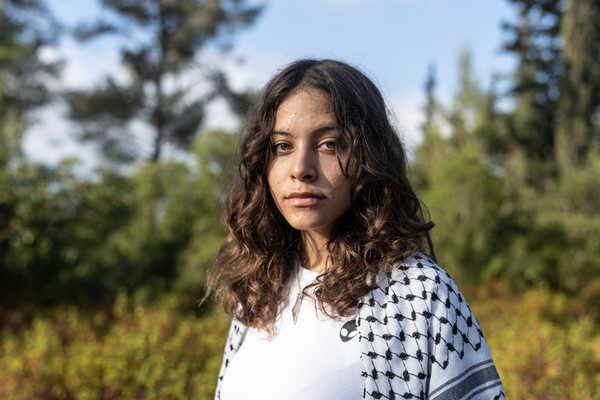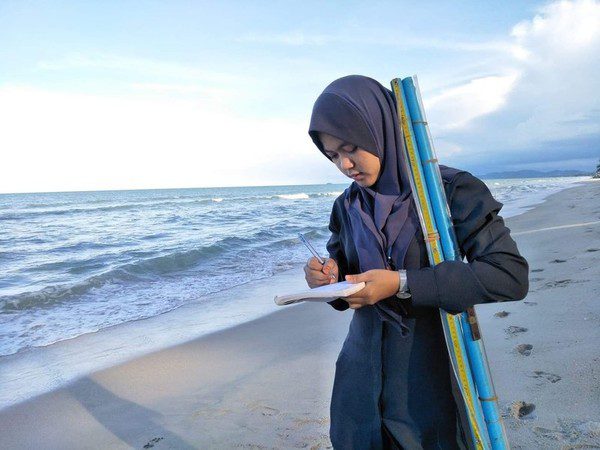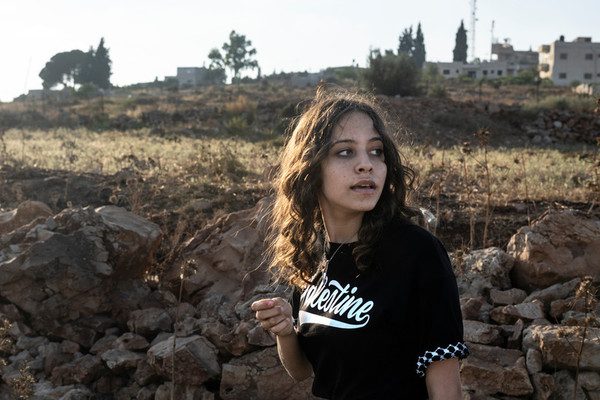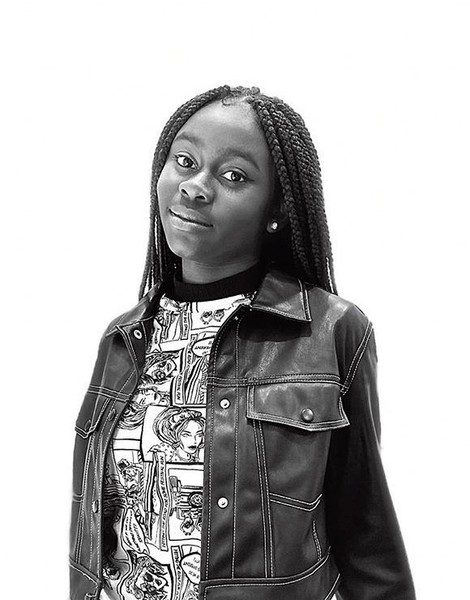Angelina Jolie and Amnesty International have joined forces to create a resource for children and young people to learn about their rights, with the publication of a new book which empowers teenagers to speak out against injustice.
Know Your Rights and Claim Them explains how the concept of children’s rights came into being, features how-to guides, as well as a number of inspiring stories from young activists at the forefront of human rights change.
On International Day of the Girl 2021, Khairiyah from Thailand, Janna from Palestine, and Oluwatomisin from Nigeria, share their incredible stories of activism, proving that change is possible when we stand up to injustice.
“I want the next generations to have the right to grow up in the same nature I grew up in”
Khairiyah Rahmanyah, 19, was born to a fishing family in southern Thailand. An area rich in biodiversity, her community depends on the sea for food and livelihoods. In 2020, when she was seventeen, Khairiyah launched a campaign against the Thai government’s plan to develop a natural gas pipeline between Thailand and Malaysia.
“I was born 19 years ago into a fishing family in the Southern coast of Thailand, in a village called Chana. My life – and the lives of everyone in Chana – revolves around the ocean. Fishing is the main source of livelihood for most of the community, with catches exported across Asia to countries like China, Vietnam, Korea and Japan.
In Chana, fishing is a family business. On the weekends, the local children will go out onto the water to help fish with their parents. I have many great memories of weekends at sea with my father. As well as providing us with an income, the sea is a rich source of food. The waters around my village are also home to endangered marine species, such as sea turtles and rare pink dolphins.
Everything changed in Chana when they started developing industrial areas around the village in 2019The government planned to install a natural gas pipeline between Thailand and Malaysia, which requires construction deep under water. The boat they used to start this work was around 30 metres long. It prevented fishermen from doing their jobs and children from playing in the sea.
The structures they were building would have a huge impact on local people’s lives and on biodiversity. When the construction began, my childhood disappeared. Chana is sustainable – I can see the sea life, the whole area was green, but when this work began, I saw this difference, and it felt difficult to adjust to. What the government is trying to do is destroying our lives.
In 2020, when I was seventeen, I launched a campaign against the Thai government’s plan to develop Chana into an industrial estate. I spent many hours picketing and travelled 1,000 kilometres to Government House in Bangkok to deliver a letter to the prime minister, begging him to stop the development.
As a result, the infrastructure project has been put on hold. There is a new consultation and research is being done, this time with the participation of the community.
As a young person, if you want to see change, you have to fight for it. It’s the only way we can enjoy our basic human rights”
Khairiyah Rahmanyah
I live with the sea, eat from the sea and grew up with the sea. There is a tie between us – a strong one. I grew up seeing my parents protecting Chana and I want to grow into adulthood in a place filled with environmental wealth just like we have now. I want the next generations to have the right to grow up in the same nature I grew up in. As a young person, if you want to see change, you have to fight for it. It’s the only way we can enjoy our basic human rights and it’s up to adults to support us and provide guidance.
Words cannot explain how I feel to be part of this book – I am really proud of myself, but more for the fact I can represent the stories of the people in my community. There are a lot of people who have fought with me – I am not doing this on my own, I am representing my community.”
“Why would I stay silent if I want to change the reality of what we’re living through”
Janna Jihad, 15, grew up in the small Palestinian village of Nabi Saleh. In 2009, when Janna was three, her community began weekly demonstrations, but they were met with violence. When she was five, Janna’s uncle and her friend were killed by the Israeli military. Age seven, she decided to act. She used her mother’s phone to record the struggles she was facing on a daily basis and became a human rights reporter. By the time she was a teenager, her live videos were watched by hundreds of thousands of people. In 2018, she became the youngest Palestinian press card-carrying journalist in the world, at the age of 12.
“Growing up in my country is super hard. I’ve lived my whole life under the occupation, hearing its sounds, like tear gas canisters being fired through the air. I’ve been afraid of being killed, arrested, injured. I’ve never been able to play with my friends peacefully. We are not living a normal life.
I first became a journalist when I was 7 – when I saw there was not enough coverage of what we’re living through. I saw my cousin and my uncle killed. My mother injured. I realised that not enough people know these feelings that we feel. I realised I had to do something, so I started taking my mum’s phone and making videos. Sharing the stories of Palestinian children is my biggest achievement and having a platform to share my daily life and struggles is something I am very proud of. Having a supportive family has helped me advocate for Palestinian rights. I am being raised by a single mum and having witnessed how strong she was living in a patriarchal society, inspired me.
I grew up in an activist family. We started our weekly demonstrations in 2009. The Israeli soldiers used to try and suppress us. We’d be marching, then the forces would come and interrogate you and arrest you. Being raised in an activist family – hearing the stories of my grandma or grandpa, listening to my uncles talk about getting arrested, learning about the resistance — inspired me to not stay silent. Staying silent in such situations is impossible. Why would I stay silent if I want to change the reality of what we’re living through and what we’re still going through?
When I talk to my friends who are my age – we have so much energy. We’re done with the injustices in
Janna Jihad
the world.
The occupation affects every aspect of our lives that you can imagine. I cannot go to school without passing an Israeli checkpoint. We have been colonized under a system that violates our very basic and fundamental rights. This is why it is important for children to know what their rights are, so they can speak up when those rights are violated. Standing up for our rights can be one of the most effective ways of resisting this occupation. Reading books about your rights can be extremely educational and informative. It can be a pathway for children to learn about their rights. They can also learn about other people’s rights – and stand up for them too.
Resistance can come in millions of ways and I believe the youth are the ones who are going to make a change. Our generation are so done with all of this. When I talk to my friends who are my age – we have so much energy. We’re done with the injustices in the world. I believe we are the generation of change, but we need to know how to demand them. I hope we can get together and put an end to racism, apartheid and settlements. Us uniting is something that is very important. It is the only way to make a change in this world!
My hope is for a liberated Palestine – a country where there are no checkpoints, no raids, no bombs, no fear. To live in my house, in a place where I am safe. I just want a normal, peaceful life where I see justice and equality for everyone, where everyone lives in peace and harmony.”
“Human rights are the most important thing you can have”
At 12-years-old, Oluwatomisin (Tomisin) Jasmin Ogunnubi developed an award-winning mobile app called ‘My Locator’. The safety tracking app is designed with children in mind and features an alert button that links to the Lagos State emergency services number. The teenager was inspired to develop the app following years of kidnappings and child abductions in Nigeria, including the notorious attack in 2014 in which 279 schoolgirls were captured in Chibok by Boko Haram. Tomisin, now 18, has also created an initiative, Girl Bridge, to provide mentorship to girls.
“I was lucky to grow up in a privileged home compared to other children. I was given protection and other human rights. I didn’t realise things were amiss until I got older, then a different reality began to hit me. It became clear that people are facing corruption, poverty, gender inequality. Child labour was another huge thing. Seeing the realities people had to face made me want to find solutions. I developed these skills in coding and computer science and wanted to use my skills to make something good happen.
“I was scared when the Chibok girls – at a boarding school, similar to mine – were abducted and taken. I was 11 or 12 at the time. It could have happened to me. It was a fearful time. The app was meant to be an experiment – could I do something to target insecurity in my community? So, if someone is in an emergency situation they can click on a button and it can send information to designated contacts. The app has now amassed over 1,000 downloads. One of the reasons for the recognition was that you don’t see girls my age in STEM (Science, Technology, Engineering and Mathematics). But it’s not something that is just for boys.
“Using what I have to add value is what I’ve learnt from my parents. Technically that would be at the heart of activism – being of value to people. In addition, my mum is a gender specialist and a human rights advocate and that pushed me to think more about these topics and issues.
Knowing your rights is very powerful. You can rise up as an activist and demand that your community is not mistreated. You can improve lives”
Oluwatomisin Jasmin Ogunnubi
“Human rights are the most important thing you can have. You can come into a situation where your rights are being threatened and knowing your rights can prevent this. Once you’re informed about what you’re entitled to – it can help you prevent abuse or mistreatment. It can give you power against people who want to undermine you. For example, if many people knew education was a right, they would demand it from the government. It makes you want to push for it. Not being given that education is not normal. Knowing your rights is very powerful. You can rise up as an activist and demand that your community is not mistreated. You can improve lives.
“People who read “Know Your Rights and Claim Them” can take hints from these stories so they can claim their rights and make better situations for themselves. The book addresses people from all different spheres of life and empowers an entire community of young people.
“I am passionate about bridging the gender gap in STEM (Science, Technology, Engineering and Maths). Girls when given the resources can make huge strides. We don’t have to marginalise people based on who they are. I hope for a future where fewer people are discriminated against, largely because they know their rights and they can use it to their advantage.”
Know Your Rights and Claim Them is available in the UK, USA, Canada, New Zealand and Australia. It is available online and from all good bookshops. Amnesty International’s online human rights education course is available now on the Human Rights Academy. More language editions will be out next year.





